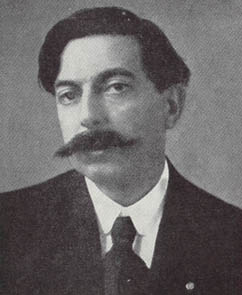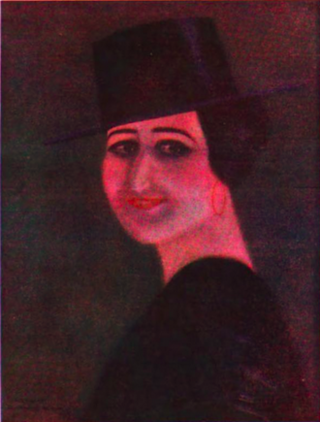Related Research Articles

Zarzuela is a Spanish lyric-dramatic genre that alternates between spoken and sung scenes, the latter incorporating operatic and popular songs, as well as dance. The etymology of the name is uncertain, but some propose it may derive from the name of a royal hunting lodge, the Palace of Zarzuela, near Madrid, where that type of entertainment was allegedly first presented to the court. The palace in turn was named after the brambles that grew there.

Pantaleón Enrique Joaquín Granados Campiña, commonly known as Enrique Granados in Spanish or Enric Granados in Catalan, was a Spanish composer of classical music, and concert pianist from Catalonia, Spain. His most well-known works include Goyescas, the Spanish Dances, and María del Carmen.

Luis de Pablo Costales was a Spanish composer belonging to the generation that Cristóbal Halffter named the Generación del 51. Mostly self-taught as a composer and influenced by Maurice Ohana and Max Deutsch, he co-founded ensembles for contemporary music, and organised concert series for it in Madrid. He published translations of notable texts about composers of the Second Viennese School, such as Hans Heinz Stuckenschmidt's biography of Arnold Schoenberg and the publications of Anton Webern. He wrote music in many genres, including film scores such as Erice's The Spirit of the Beehive, and operas including La señorita Cristina. He taught composition not only in Spain, but also in the U.S. and Canada. Among his awards is the Premio Nacional de Música.
Cristóbal Halffter Jiménez-Encina was a Spanish classical composer. He was the nephew of two other composers, Rodolfo and Ernesto Halffter and is regarded as the most important Spanish composer of the generation of composers designated the Generación del 51.

José María Coronado García is a Spanish film and television actor and former model. His performances playing law enforcement officer roles have brought him some of the greatest successes of his career.

Tonadilla was a Spanish musical song form of theatrical origin; not danced. The genre was a type of short, satirical musical comedy popular in 18th-century Spain, and later in Cuba and other Spanish colonial countries.
Antonio Rodríguez de Hita was a Spanish composer.
José Castel was a Spanish composer.

Francisco Mariño y Soler was a soldier, politician, and aristocrat. He was a patriot and Knight of the Order of Santiago.
Benito Bello de Torices was a Spanish composer, maestro at the Convent of Las Descalzas Reales and professor of music at the Royal College of Pages of His Majesty, Madrid, during the reigns of Charles II and Philip V. His family was minor gentry. His surviving works include villancicos, estribillos.

María Esteve Flores is a Spanish actress.
Blas Tardío de Guzmán was a Bolivian criollo composer, one of four notable criollo students of Juan de Araujo. He succeeded Juan Guerra y Biedma as chapelmaster, maestro de capilla, of the Cathedral of Sucre, then called La Plata, in 1745.

Raquel Andueza is a Spanish soprano. She has been a member of La Colombina vocal quartet led by baritone Josep Cabré since 2003. In 2011 she launched her own record company Anima e Corpo.
Pablo Esteve y Grimau (1730–1794) was a Spanish composer. Esteve was conductor and house-composer for the Teatro de la Cruz in Madrid during the peak of the popularity of the tonadilla genre. The risque nature of the tonadilla meant that Esteve was once briefly jailed for sarcastic references to a duchess in one of his compositions. The actress who sang the tonadilla on stage escaped jail by claiming she paid no attention to what she was given to sing.
El huésped del sevillano is a 1926 zarzuela in two acts with music by Jacinto Guerrero and a libretto by Juan Ignacio Luca de Tena with Enrique Reoyo.

Pablo Guerrero is a Spanish singer-songwriter, lyricist, and poet from Extremadura in Spain.

Bárbara Lennie Holguín is a Spanish actress, hailed as an indie cinema star. She won the Goya Award for Best Actress for her performance in the 2014 neo-noir drama Magical Girl, also scooping nominations for Obaba, El niño, María , and God's Crooked Lines.

Pablo Casado Blanco is a Spanish former politician. He was a member of the Congress of Deputies representing Madrid until 4 April 2022, having previously represented Ávila between 2011 and 2019. From 2015 to 2018, he also served as vice secretary general of communication of the People's Party (PP). From July 2018 until April 2022, he was the president of the PP.
Events of 2019 in Spain.

The Headquarters of the People's Party are located at number 13, Calle de Génova in Madrid, Spain, at the corner with Calle Zurbano. In the Spanish media, "Génova" is used as a metonym for the national leadership of the People's Party.
References
- ↑ The Spanish Song Companion 2006 - Page 62 JACINTO VALLEDOR Y LA CALLE (1744-c.1809) Like Rosales, Valledor had atrocious luck in turning his talent and success into a financially viable way of life."
- ↑ Revista de musicología Sociedad Española de Musicología - 2007 -- Volume 30 - Page 17 "Es por esto por lo que para hacer este trabajo me he centrado en la obra de Jacinto Valledor. ... 1744 - Madrid, 1809) es uno de los compositores que Subirá engloba entre los maestros del período de 17. Esteve ..."
- ↑ Teresita Espinosa, Antonio Soler Selected unpublished villancicos of padre fray Antonio Soler 1969 - Volume 1 - Page 66 "Also important were the wel1-known Ventura Galvan; Pablo Moral (221:1563), violinist and successor of Esteve as composer for the Madrid theater company; Manuel Pla (104:505); and Jacinto Valledor (1744-1809) (221:2189-2190), who ...
- ↑ Mariano Pérez Gutiérrez Diccionario de la Música y Los Músicos Volume 3 - Page 308 - 1985 "VALLEDOR Y LA CALLE, Jacinto (Madrid, 1744 - Madrid, h. 1809). Comp. esp. de tonadillas*, que llegó a suplir a Pablo Esteve. Entre éstas fueron célebres la del General Mambrú, Seguidillas del apasionado, La buena consejera y Los ..."